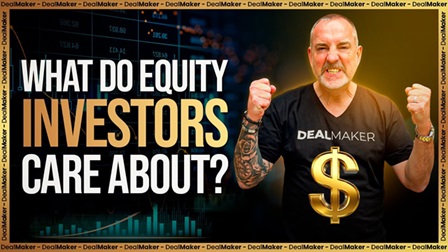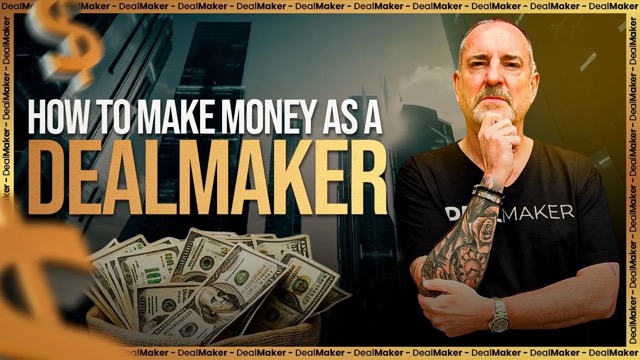Exciting Week Ahead: Dealmaker Wealth Society, eComm Roll-Up & Kings Of Deals
Exciting Week Ahead: Dealmaker Wealth Society, eComm Roll-Up & Kings Of Deals
Carl Allen, a seasoned dealmaker and founder of Dealmaker Wealth Society, offers a behind-the-scenes glimpse into his dynamic week of dealmaking, coaching, and acquisition ventures. As a visionary dedicated to disrupting the global market for buying and selling small businesses, Carl is actively involved in multiple initiatives that span coaching programs, private equity ventures, and strategic roll-ups across diverse industries.
This week, Carl dives deep into mentoring his Prodigy students, focusing on the intricacies of business valuation. He emphasizes the four critical pillars of valuation: financial metrics, deal structure, seller psychology, and transferability. These factors extend far beyond simple profit multiples, taking into account customer capital, employee strength, brand reputation, and operational systems. With these insights, Carl equips his students to accurately assess businesses across industries and negotiate creative deals.
Carl also highlights his private equity initiatives, where he collaborates with over 50 students to execute roll-ups in sectors like healthcare, professional services, e-learning, home restoration, and manufacturing. His latest acquisition target is an $8 million e-commerce business generating nearly $2 million in annual profit. By leveraging creative deal structures, Carl is finalizing this acquisition at a favorable multiple, integrating it into a larger roll-up strategy.
Beyond acquisitions, Carl shares his passion for coaching and empowering entrepreneurs, helping them build wealth through dealmaking. He reflects on his upcoming coaching sessions, board meetings, and the tools he provides to his students to navigate the complexities of business acquisition. With a focus on delivering actionable strategies, Carl is committed to helping his community thrive in the dealmaking world.
As Carl works tirelessly on a Sunday, he reflects on the fulfilling journey of being a dealmaker and mentor. Whether buying businesses, mentoring his students, or exploring new growth opportunities, Carl’s enthusiasm for dealmaking shines through. He invites his audience to join him on this incredible journey by subscribing to his channel for regular insights, strategies, and updates.
Full Transcript:
Hey, guys. Carl Allen. Hope all is well. Got an absolutely amazing week. Dealmakers, what’s up?
My vision is to completely and utterly disrupt the market for buying and selling small businesses all over the world. Got an absolutely amazing week coming up inside of Dealmaker Wealth Society, also inside of eConfolio, also inside of my Kings of Deals private equity program. So those are the three, like, massive things that I’m doing right now. As you know, I deal with the liberal societies, my coaching, and the mentoring program. So coaching thousands of thousands of deals is my private equity company. So I’m partnering with lots and lots of my students, about fifty of my students.
We’ve raised a bunch of money, and we’re buying businesses in lots of different industries. We’re doing roll ups. So we’re doing a a health care roll up, a professional services roll up. We’re doing a roll up in the e learning digital coaching space.
We’re doing a roll up in the home services industry, particularly around, restoration, type projects. And then we’re doing a roll up also in kind of engineering and manufacturing, which is really, really cool. So I’ve got the, the cup pillar meetings. So I’ve got all those strategy calls, throughout the course of the week, which is really, really good.
I’ve got lots and lots of board meetings or businesses that I already own. And then I’m teaching my Prodigy students tomorrow everything that they need to know about valuation, about how to value a business. And what’s really interesting about valuation is, and I’m the best in the world at this, right, but what most people fail to realize is they they think valuation’s purely just about the numbers. K?
Operating is this, it’s doing two hundred thousand dollars a year in in profit, and you get the multiple for that industry, let’s say two, so then the business is worth four hundred thousand dollars.
That’s the start, but there are actually four major areas to think about when you talk about valuation. The first one is the numbers. We just talked about that. So businesses will have a mathematical valuation.
What’s the profit? You’ve got to look at the, trends of the profit. You’ve got to look at the averages.
You then apply the marking multiple, and then you’ve got to look at are you inheriting any debt inside of the business? Is it also efficient? What is your capital? Are there other non core assets that are being included as part of the sale?
Very easy to kind of figure it out. But that’s only one of the four pillars. The second pillar is the deal structure. Right?
So let me explain. If you’re going to put ninety or a hundred percent of the purchase price down at the closing time. So let’s say you’re gonna buy a business and you’re gonna go down the SBA seven a round. So the SBA will allow you to do a deal where sellers get a ninety to ninety five percent of the total cash at closing, which is absolutely amazing for the seller.
So for that reason, we can pay less to buy the business. Right? So if we’re putting all the money down, we’re gonna pay less. So let’s say the median valuation is where we’re gonna put half down and then pay half in seller financing. Then, obviously, if you’re gonna put ninety percent down, you’re totally derisking the sale from a seller’s perspective so we could pay off less money.
The opposite side of that, which is a lot of the deals that we’re doing at the moment, is we’re doing something called an annuity deal. Now an annuity deal, really, really fast to get a deal that couple of weeks tops, Very light touch on the due diligence. Saves the seller a lot of tax as well. On an annuity deal, all we’re doing is basically buying the business over a long period of time, so between five and ten years.
So let let’s say we have a business doing four hundred thousand dollars a year in profit, market multiple would be two point five, so a million dollar deal. If you went down the SBA route, you might buy that business for seven hundred and fifty thousand dollars. But I can pay two million dollars if I want to to buy that business. Why?
Because to do four hundred thousand dollars a year in profit, if I split that up fifty fifty to two hundred thousand for me, two hundred thousand for the seller, and I pay that amount for ten years, then the seller’s gonna get two million dollars, not seven hundred fifty thousand. So the seller gets a lot more money, but they’re taking all the risk. Right? And there’s loads of things that we do to be risky for sellers.
We can give the performance guarantees on the business. They could have a full lean over the assets and the shares of the company. Absolutely phenomenal types of deal structure. So structure of deal affects valuation.
The more you put a close, the lower the valuation, the more that spread out into the future, the higher the valuation. Third point, seller psychology.
Right? You can have two companies that are identical. Same industry, same customers, same revenues, same balance sheets. Everything’s the same. The only difference is the owner. One owner is an entrepreneur, forty, having a lot of fun, lots of being in the business. He’s more of an owner investor versus an owner manager, so not under any stress whatsoever.
He might not wanna sell the business. He might not be a motivated seller. Now every business is for sale. Right?
Every business is for sale. It’s just a question of the price. He doesn’t care about the market multiple. He really doesn’t care.
He’ll say, well, you know what? I want a five times multiple for my business and yep the market says it’s only worth two and a half but I don’t I don’t really care. You know, if you wanna buy my business, this is what you’re gonna pay me, right? So on the other side, you’ve got a business owner that’s really highly motivated to come out.
They might wanna retire. They might be burnt out, frustrated, bored, run out of ideas, might be sick, could be sadly dying in some cases. Not just them, could be a a family member as well. So again, they don’t care about the market support.
They just wanna sell the business. They they want out. So they might be prepared to take a lower amount of money. And again, they might be prepared to take a lot of that deal over seller financing terms in the future just to get away from the business and go do whatever they wanna do next.
So that was point number three. Seller psychology also affects valuation.
And then the fourth part is what I call transfer value. Right? Now transfer value means just because it has a financial valuation, just because the structure of the deal can affect the valuation, and just because the seller psychology can affect the valuation, in some cases, it still might not have any value. Why is that? So transferability of a business comes down to four things.
The strength of its customer capital, the strength of its employee capital, the strength of its social capital, which is about its brand, its culture, its reputation of the market, and the strength of what I call structural capital, which is its systems and its processes and its KPIs and the SOPs inside of that business. So you’ve got to look at those four different things. And you can kind of convert it into a mathematical equation because, you know, whatever we value the business at, let’s say four hundred thousand dollar profit, two and a half times multiple million dollar deal, right, And let’s say we’ve done all the other things we just talked about.
But that business will have what I call a liquidation value. It’s a certain percentage of its net asset value on the balance sheet. So let’s say that’s two hundred k. So there’s eight hundred thousand dollars now in that valuation, which is called goodwill.
That’s the amount you’re paying for a business over and above the liquidation value of the balance sheet. Liquidation value of the balance sheet means that the sellers had enough, they can’t find a buyer, they’re literally just gonna close the door and turn off the lights, slip it out the balance sheet, and walk away with the cash. Right? A lot of business owners actually do that because they can’t find a buyer.
This is one of the reasons why I built Dealmaker World Society to connect sellers and buyers together so people could retire or exit in a in a dignified way and not not have to shut their businesses down. So what’s interesting is that goodwill is built up from those four pillars. Customer capital, employee capital, structural capital, social capital. And you can model all this stuff out.
So there’s a lot of stuff in there, and what I’m teaching my protegees tomorrow, it took me about two hours to do it, is how to look at any business with any seller in any industry and looking at all those four kind of pillars of goodwill. And then I build on a really awesome little tool, which means they can calculate all the ranges. That is absolutely amazing. So I’m really looking forward to that.
And I’ve got all my kings of deals, pillars as well that, we’re gonna be working in. And then I’m buying an eight million dollar e com company this week, which is really, really cool. My goal is to get it to Dorela Y, tomorrow or Tuesday.
Phenomenal business. Only three years old, but it’s doing nearly two million dollars in profit. I’m able to buy the business for about four and a half times, its current year. Multiple, which is very, very good. So very, very interesting business. Got tons of inventory.
Two phenomenal founders that have started that business and kind of scaled it up. And they don’t necessarily wanna leave. So we’re gonna put the business into one of my roller pillars. And, yeah, it’s gonna be, it’s gonna be really, really interesting.
But my business partner on the deal, he’s going on safari for his wife’s birthday, tomorrow. So, I got a lot of stuff to get done before he, he hops on that plane. There’s gonna be documents to sign and all bunch of different things. So I’m working today.
I I’m I’m going into the office for a couple of days.
Normally don’t work on a Sunday. But, my my son’s out with his buddies. My wife’s out with her girlfriends.
My daughter and granddaughter, are on a weekend trip away. So, I was kinda home alone. And I thought, well, you know what? Do I sit in my country estate for four hours on my own, or should I go to the office and get a Starbucks and just kinda noodle on a lot of this really, really cool stuff because, you know, I absolutely love being a deal maker. I love coaching my students, you know. Hey, if you’re watching. And, guys, don’t forget, hit subscribe.
Hit the like button, hit subscribe, and you’ll get all of my new content in real time. I wanna be putting stuff out to you guys kind of almost every day, just to keep you on your toes. This is gonna be a phenomenal ten years ahead that we have in the deal making journey, and I can’t wait to serve you and give you incredible value, on a daily basis. So, I’m gonna go get some work done. I will see you guys soon. Until then, bye for now.




